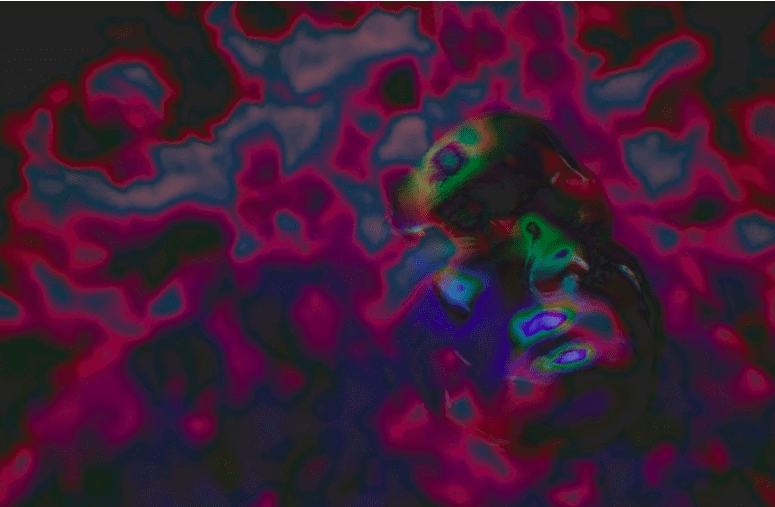bitforms, New York, United States
23 Jun 2022 - 30 Jul 2022

LaJuné McMillian, Self Portrait 3, 2022. Dye-sublimation on aluminum. 40 x 22.5 in / 101.6 x 57.2 cm. Edition of 3, 1 AP
bitforms presents LaJuné McMillian’s first solo exhibition with the gallery. Embodied Metadata is described as the data about the data that our bodies produce. Exhibited works transform this metadata into incarnate portraiture traced through movement.
The exhibition begins with a series of self-portraits—nine videos are displayed in a triptych format that surge in and out of focus on the artist’s avatar, a portrait that was created from a 3D scan. Next to this work, the undulating abstractions are actualized in printed hues. McMillian utilizes digital systems as a mechanism to confront the limitations of Western technology, specifically in terms of how it may harm, isolate, restrict, and ignore the needs of Black people. This series questions how bodies are, and can be, translated and accounted for in ways that humanize the self beyond the data it produces. What worlds must be built for the liberated body to exist? How are liberated bodies cared for in and outside digital means? In addition to cost and accessibility, technology’s extractive procedures often decide who is seen and recognized in space. The artist acknowledges these biases alongside America’s exploitation of Black people with a remedial practice that instead considers an ideology of “embodied metadata.” This term repositions metadata gathered through motion capture as a cultural asset that is celebrated through individual movement. McMillian comes to this process as a ritual, rendering space for Black bodies.
Since 2018, the artist has been maintaining an ongoing project called the Black Movement Library (BML), a resource for activists, performers, and artists to create diverse expanded reality projects. McMillian’s Movement Portraits are part of this archive and presented in the gallery as video and a virtual reality experience. Ethereal electronic music accompanies fluid, lustrous performances as vivid colors kaleidoscope from avatar’s kinetic figures. All performances are developed with motion capture, then placed in a landscape crafted by the artist—a space that acts as an other-worldy portal to facilitate expression free from the violence imposed upon Black bodies. Newly debuted 2022 Movement Portraits include the second version of Nala Duma and Renaldo Maurice’s portraits, as well as the debut of McMillian’s collaborations with Roukijah Rooks, RaFia Santana, and Roobi Gaskins. Each video includes an interview that expands upon the performer’s consideration of movement. Part documentary, part abstract performance, embodied metadata is unapologetically demonstrated as a declaration of liberated reality. Presentations of this series are on view at both Tribeca Film Festival (June 9–18) and in Times Square for the Times Square Arts Midnight Moment (June 1–30).
Antidote, co-authored by McMillian and choreographer and educator Marguerite Hemmings, speaks to embodied metadata as an anthropology, parsing it as a technology that is both inherited from past generations and activated as a world building tool. The work considers the emancipative capacities of movement, and how the healing of bodies and lands can be enacted inside of virtual reality technologies. Framing Antidote is a virtual land acknowledgment authored by Hemmings, McMillian, creative technologist Salome Asega, and Afro-Indigenous activist Amber Starks (Melanin Mvskoke). Together, they address the colonial contexts that frame human relationships to both land and cyberspace, proclaiming, “Antidote is online and away from keyboard…A place that cultivates networks of care to conceal and protect each either…Technology is not just an assembly of the body, but also an assemblage of tools that have been passed down and inherited for us to mesh and knit our survival, pleasure, and growth.”
The acknowledgements in Antidote inform McMillian’s latest work, Spirit & Child. This video offers an exchange of prayers between two self-portraits. A healing ceremony unfurls as Child extends gratitude to Spirit for holding them though the pains and sadness of oppression and anti-Blackness. Spirit manifests as a guide within many of McMillian’s pieces, reinforcing ancestry as a robust technology. Spirit & Child acts as a compendium of the artist’s own experience—beginning with the introduction of self-portraiture, expanding on the ritual of movement, and broadening to meditative aphorisms—and in closing, Spirit reminds the viewer that home, a place many spend lifetimes seeking, lives inside ourselves.
LaJuné McMillian, born 1992, New York. Lives and works in New York. LaJuné McMillian is a new media artist, and Creative Technologist creating art that integrates performance, extended reality, and physical computing to question our current forms of communication. McMillian has shown and spoken about their work at Pioneer Works, National Sawdust, Leaders in Software and Art, Creative Tech Week, and Art && Code’s Weird Reality. The artist was previously Director of Skating at Figure Skating in Harlem, where they integrated STEAM and Figure Skating to teach girls of color about movement and technology. They have continued their research on Blackness, Movement, and Technology during residencies at Eyebeam, Pioneer Works Barbarian Group, and Barnard College.